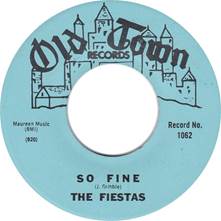When Rita and I toured the Hall of Fame in Cooperstown last summer, we were drawn like most to the plaque room where 314 players, managers, umpires and executive are enshrined. That number will increase to 319 at the end of this month when Ivan Rodriguez, Tim Raines, Jeff Bagwell, John Schuerholz and Bud Selig will be inducted. But those are not the only awards to be handed out on Hall of Fame Weekend. The other recipients are not “inductees,”, but they are a vital part of the fabric that is baseball.
Buck O’Neil Lifetime Achievement Award: The HOF established this award to honor an individual whose extraordinary efforts have broadened the game’s appeal and whose character, integrity and dignity is comparable to Buck O’Neil. The award is to not be given more than once every three years. The first award went to Buck in 2008, and the next two went to executive Roland Hemond (2011) and sportscaster Joe Garagiola (2014). The 2017 honoree will be Rachel Robinson, widow of Jackie.
Ford C. Frick Award: This award, named after a former commissioner, was first given in 1978 (to Red Barber and Mel Allen). Some other notables: Vin Scully, Ernie Harwell, Harry Caray, Joe Garagiola, Russ Hodges and Jack Buck. In 2007, the award went to Denny Matthews of the Royals. The 2017 honoree will be Bill King of the Oakland Athletics.
J. G. Taylor Spink Award: This award is voted on by the Baseball Writers’ Association of America and is named after the long-time editor of The Sporting News. Spink was the recipient of the first award in 1962, and he has been followed by the likes of Ring Lardner, Grantland Rice, Damon Runyon, Red Smith, Peter Gammons and Roger Angell. In 1984, the award went to the Kansas City Star’s Joe McGuff. In 1993 and 1997, the awards went to Wendell Smith and Sam Lacy, pioneer sportswriters in the black press who were instrumental in the integration of baseball. The prior 67 winners, all men, will be joined this year by…
Claire Smith – Sportswriter: In 2017, the Spink award is going to Claire Smith, the first woman to be so honored. This past March, after her award was announced, Smith came to the Negro Leagues Baseball Museum to participate in a discussion about “Black Women in Sports.” Rita and I attended and became Claire Smith fans. This photo of Rita with Smith is on the Field of Legends at the NLBM. Center fielder Oscar Charleston is the player behind them.
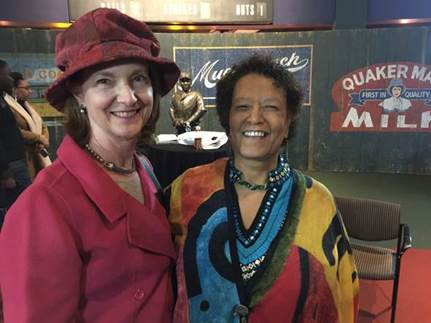
Smith got her love for baseball from her mother who became a Dodgers fan when the team signed Jackie Robinson. Although Smith never saw Robinson play, he became her hero and she joined her mother as a Dodgers fan even though the family lived in Pennsylvania. During college, Smith found that she enjoyed writing and dropped out to pursue a career as a sportswriter. She worked her way up the newspaper chain and got a big break in 1982 when she became a beat writer for the Hartford Courant, covering the Mets and then the Yankees. She was a beat writer and national baseball writer from 1982 to 2007, including stints at the Philadelphia Inquirer and the New York Times. In 2007, she joined ESPN as a baseball editor who travels with the on-air talent to help them deal with the hard news behind the balls and strikes. As evidenced by the award given by her peers, she is a revered colleague and sportswriter.
When the Negro Leagues Baseball Museum recently received $1,000,000 from the Major League Baseball Players Association and Major League Baseball, this tweet was sent out by Smith:
| Claire Smith (@MzCSmith) | |
| 6/21/17, 1:58 PM
Somewhere, Buck O’Neal, Jackie Robinson, Branch Rickey, Larry Doby & all who were on the front lines at the start are smiling! @nlbmprez ❤️ twitter.com/karlravechespn… |
|
Take a close look at the photo Smith uses for Twitter. It is the same setting as the one with Rita above, on the Field of Legends with Oscar Charleston looking on.
A Bad Day: Claire Smith became the subject rather than the writer regarding an incident at Wrigley Field in 1984. To give some perspective, I will start with the 1975 NHL All-Star game held in Montreal. With little pushback, two female sportswriters joined their male counterparts in the hockey locker room. This is credited with being the first time that women were allowed in the locker room in a major professional sport. I don’t know if it is a French Canadian thing, but the same city was the testing ground for Jackie Robinson before he moved up to the Dodgers. The situation was somewhat different because there had always been black baseball players, but women sportswriters were mostly a new thing.
The hockey action prompted baseball commissioner Bowie Kuhn to announce that equal access would not apply to baseball. Some teams were more open to the idea, specifically the Yankees who knew that New York teams in the NBA, ABA and NHL had granted access. The process in hockey and basketball did not create much publicity, possibly because lawsuits had not been necessary. Although some MLB teams quietly allowed women into the locker rooms, the official position of MLB remained a firm no from Kuhn.
In 1977, the Yankees won the World Series, led by Reggie Jackson hitting three home runs in the final game. Melissa Ludtke of Sports Illustrated wanted to get post-game comments from Reggie, but Kuhn specifically barred her from the locker room. The male sportswriters got their stories over a two hour period after the game. Thanks to Google, I found a photo of the scene.
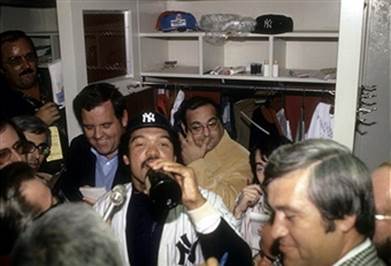
When Reggie finally exited to where Ludtke had been waiting in the hall, he begged off because he was exhausted. Sports Illustrated sued Kuhn and the Yankees and won equal access for the 1978 playoffs. The judge (a woman) said if there was a privacy worry, the club could install a curtain or instruct the players to wear towels. The ruling only applied to Yankee Stadium as that was the only team before the court. The other three teams in the 1978 playoffs did not allow equal access (Royals, Phillies and Dodgers).
Kuhn appealed the ruling, but eventually dropped his appeal and left the matter to the discretion of the individual clubs. The path was rocky as the fans, players, managers, owners and male sportswriters had strong opinions on both sides of the issue. Some considered it a question of equal access while some thought the women just wanted to see naked men. Roger Angell had filed an affidavit with the court in support of Ludtke and he penned a long essay in The New Yorker in April of 1979 (“Sharing the Beat”). He interviewed a number of sportswriters and players and had comments that ranged from being thoughtful about privacy to pure sexist. One of Angell’s interviews took place in the New York Nets locker room after a game. He approached Phil Jackson, then player-coach for the Nets, who was talking with Melissa Ludtke (there she is again) and her sportswriter husband Eric Lincoln. In Angell’s words:
“I…ended up in conversation with Phil Jackson, a bony, bearded six-foot-eight forward and center…He was toweling himself after his shower and chatting with Eric and Melissa…Jackson said [about women in the locker room] ‘Nobody thinks about it anymore…I don’t know why baseball makes so much of it all. Nobody cares or notices. Nobody looks – except for Melissa here. Melissa is a peeker, a regular Peeping Thomasina.’ He laughed, and we laughed, and he put on his underpants.”
Cartoonists also weighed in:
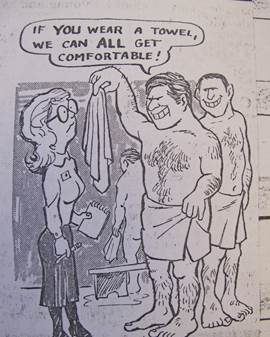
In 1984, AL President Lee McPhail made equal access the rule in his league. NL President Chub Feeney continued to leave it to the individual clubs. Big mistake. The Padres and Cubs were in the 1984 NLCS, and the Padres were notoriously unfriendly on the issue of equal access (it did not help for Smith that some Padres were members of the John Birch Society). Smith’s editor checked with Feeney’s office and was assured that Smith would be allowed in the Padres locker room at Wrigley Field. When she entered after the first game, Smith was physically ejected. After she was thrown out, Padre star Steve Garvey went outside to give her game comments. She also knew several of the Cubs who had once played for the Yankees and they sided with her, embarrassed that this had happened at Wrigley Field.
Smith’s ouster became big news, and she received some strong support. In her words: “Those are the folks I want to remember the most: Goose, Garvey, the Cubs, the Yankees, who filed an amazing protest against what the Padres did. When I asked the Yankees’ media director why they were doing it, he said ‘Because no one treats Yankee beat writers like that.” The dispute went to Peter Ueberroth who had become commissioner that very week. Ueberroth quickly ended the matter by unilaterally opening all clubhouses to anyone with credentials. The battle for equal access in baseball was over. This did not mean the end of sexism in baseball any more than racism ended with Jackie Robinson. But it was a significant milestone. In 2014, Smith wrote this about her experience:
“People ask me all the time, ‘What was the hardest thing to overcome, being a woman, being black,’ and I said it’s no contest because it’s unacceptable to be a racist, but it’s still very acceptable to be an idiot when it comes to gender. And that’s been proven over and over and over again. I could never imagine someone dropping the n-word in the clubhouse then. There would have been hell to pay. But, some of the stuff that comes out of players’ mouths that are aimed at women, it’s just juvenile. And it still happens today.”
Judy Heeter, a Kansas City attorney and Hot Stove reader, was for many years the Director of Business Affairs and Licensing for the MLB Players Association. She has known Claire Smith for over 25 years and has this to say about her friend:
“Claire deserves this recognition, and more, not just for the quality of her work but the quality of her character. I personally can attest to the tough environment she’s endured with grace and humor throughout her career, and my chest tightens even now as I’m reminded how it feels to be the only girl in the room for more than 20 years and sometimes vilified for being female. In my experience, this most often came from management, not the players, and we both received support and long-term friendships from players like Reggie Jackson, Dave Winfield, Kirby Puckett, Kenny Lofton and others, probably because they knew how discrimination felt.”
Claire and Reggie:
.
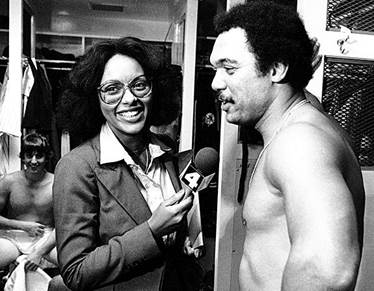
In 2013, ESPN produced a documentary on the history of women in the locker room, aptly titled “Let Them Wear Towels.” Smith and Ludtke are featured along with other women writers.
Women in the Hall of Fame: The awards to Claire Smith and Rachel Robinson will triple the number of women honored by the Hall of Fame. Effa Louise Manley was inducted in 2006. She was the long-time co-owner and business manager of the Newark Eagles in the Negro Leagues, a team that sent the likes of Larry Doby, Monte Irvin and Don Newcombe to the major leagues. The Eagles won the 1946 Negro World Series, the last year before integration of the majors.
![]()
![]()
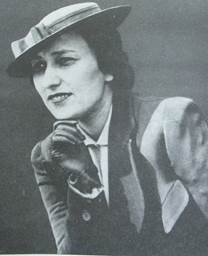
Effa Manley will soon have some very special sisters in the Hall of Fame.
![]()
![]()
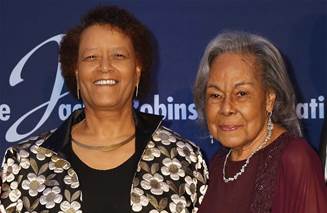
As for Rachel Robinson’s selection to the O’Neil Award, I turn to Joe Posnanski, long-time friend of Buck. From Joe’s blog:
“When they announced that Rachel Robinson won the Buck O’Neil Award, I almost broke down in tears thinking about how proud Buck would have been of the moment. There’s no need to write about the grace, the power, the beauty of Rachel Robinson, who endured like Jack did, who fought like Jack did, who triumphed like Jack did. Until this award, there really was no way for the Baseball Hall of Fame to honor Rachel, though she is as important to baseball as anyone in the plaque room. Now: Perfect. The Hall isn’t just honoring Rachel Robinson. They’re honoring her in precisely the right way.”
Women in the Locker Room – The Lighter Side: Jane Leavy is well known for two best-selling biographies: Sandy Koufax: A Lefty’s Legacy (2005) and The Last Boy: Mickey Mantle and the End of America’s Childhood (2010). I am anxiously awaiting her next book which will be about Babe Ruth. But this is about her other published book, a novel from 1990 titled Squeeze Play.
In the late 70’s, Leavy was writing for the New York Daily News and found the same split in sports that Melissa Ludtke had experienced: Leavy could not get into the locker room at Yankee Stadium, but she was able to visit the NBA’s Knicks at Madison Square Garden (where Phil Jackson was her “first” out of the shower; he was cordial and helpful to her story – must be something about “Zen Master” Jackson, he was likewise naked when helpful to Roger Angell – see above). Leavy then became a Washington Post beat writer for the Orioles from 1979 to 1983. The Orioles’ equal access policy introduced her to a world that she calls a mix of “chivalry and Animal House.” She was amused by some players thinking the reporters wanted them, but she notes that the locker room is not really that great: “They sweat. They smell. They scratch. My fantasy, they’re not.” It clearly gave her some good material for her next step.
After leaving the Post, she wrote Squeeze Play, a satire about a woman baseball writer with access to the locker room. If you liked the Dan Jenkins’ book Semi-Tough about football, you will like Leavy’s Squeeze Play about baseball. I thought it was hilarious and full of smart baseball. Sportswriter Allen Barra agreed in his review: “It is the funniest, raunchiest, and most compassionate baseball novel I’ve ever read and is sure to offend some people who cried during Field of Dreams – and that’s good enough for me” (his full review is an entertaining read and will give you some warning of what to expect.
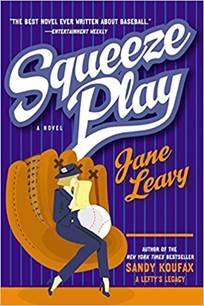
Lonnie’s Jukebox: To end this post, I picked out a golden oldie from 1959. At teen town, we were looking for songs with the right beat to dance to what we called the “West Coast” – two of the best were “Honky Tonk” by Bill Doggett and “Kansas City” by Wilbert Harrison. Another was this one-hit wonder by the Fiestas, “So Fine” (click here).
